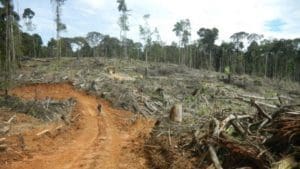 Over the last few years, there has been a lot of talk about sustainability, green initiatives, and the reduction of carbon emissions from major companies around the globe. This is especially true as companies look at their supply chain. In the same light of making supply chains more responsible, a growing trend is the fight to end deforestation. As the term implies, deforestation is the removal of forests or woodlands for non-forest use. There are four major commodities that are responsible for more than a third of global deforestation, and these products are found on store shelves everywhere – palm oil, wood products, soy, and cattle.
Over the last few years, there has been a lot of talk about sustainability, green initiatives, and the reduction of carbon emissions from major companies around the globe. This is especially true as companies look at their supply chain. In the same light of making supply chains more responsible, a growing trend is the fight to end deforestation. As the term implies, deforestation is the removal of forests or woodlands for non-forest use. There are four major commodities that are responsible for more than a third of global deforestation, and these products are found on store shelves everywhere – palm oil, wood products, soy, and cattle.
Palm oil is the most commonly produced vegetable oil and is found in everything from processed foods to body creams and soaps. Rain forests are being bulldozed and burned to make more room for more palm oil plantations, which is driving endangered species from their homes. A large percentage of palm oil is used in biofuels which is releasing elevated CO2 emissions into the atmosphere as well.
Wood products run the gamut from materials for building to wood pulp which is used in packaging materials. Many retailers have made the concerted effort to reduce their reliance on wood pulp sourced from companies that contribute to deforestation. As a result, these companies are looking at alternative packaging methods.
Soy is in just about everything these days. But that is not the reason it is on the list of the big four commodities causing deforestation. The majority of soy ends up as animal feed as the demand for meat increases around the world. The high consumption of meat is resulting in more space needed to grow soybeans, which results in deforestation. Soybean oil is also used as a biofuel, which has the same results on CO2 emissions as palm oil.
As mentioned above, the increased demand for meat has resulted in an increase of deforestation. The demand for beef is growing; and cattle ranches in particular require more space that other animals raised for food. This puts cattle as one of the big four commodities as well.
One of the commodities making headlines now is not identified as one of the largest causes of deforestation – cocoa. But, major players in the world’s chocolate industry have joined forces to stop deforestation in major cocoa producing countries, namely Côte d’Ivoire and Ghana. Nestlé, Mars, Mondelez, Cargill, and Olam have signed an agreement in which they acknowledge that their cocoa supply chains and procurement practices have contributed to the destruction of forests. The agreement indicates that these companies will work together to develop a solution to the problem, which will be no easy task.
The five chocolate giants will then present their plan to stop deforestation at the United Nations Framework Convention on Climate Change conference at Bonn, Germany, in November. The solution will be a tricky one indeed, as land is needed in order to grow cocoa. And more cocoa is needed as global demand rises. For example, according to UN data, global cocoa production increased by 275% between 1961 and 2014 as a result of increased demand. This has resulted in significant loss of forests in South America and West Africa. However, the companies will work for a way to make their cocoa supply chains more sustainable.
Without this initiative, the cocoa supply chain will continue to increase deforestation. Hopefully, Nestlé, Mars, Mondelez, Cargill, and Olam can come up with a realistic plan of action to eradicate the destruction of forests around the world. Luckily, these companies have worked together before, coming up with a plan to increase cocoa production when suppliers were struggling to meet demand. Unfortunately, this plan is probably a contributing factor to the situation we are in today. But if any good can come about from it, it is the fact that they can work together to achieve results. I look forward to seeing the plan they propose in November.

















